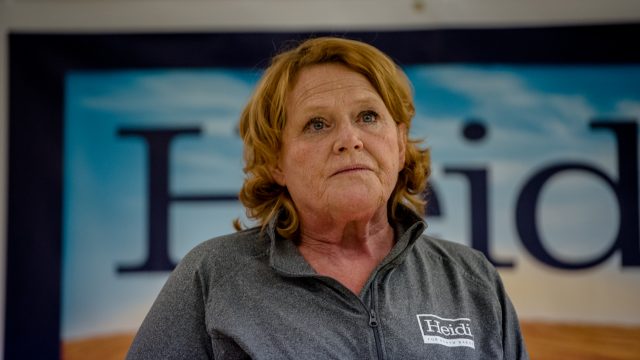Heitkamp to North Dakota: It’s Ironic You Rubes Didn’t Vote for Me

Sen. Heidi Heitkamp (D-N.D.), who is running for re-election, talks to voters at AFL-CIO House of Labor in Bismarck, N.D., Nov. 5, 2018. Rep. Kevin Cramer, who latched onto Donald Trump even before he was president and never let go, ousted Heitkamp on Tuesday, flipping a key seat that was vital to Republican efforts to hold the Senate. (Hilary Swift/The New York Times)
Now comes the time in erstwhile Senator Heidi Heitkamp’s political career when she works with sympathetic media allies to try and rewrite the history of her fall from elected office.
The Senator did an interview with my colleague Mike McFeely – a former employee of her brother’s – and in it suggested there is “great irony” in some North Dakotans voting against her.
Specifically, she’s referring to the oil and coal industries:
“They rolled the dice that we’re going to bet only on politics, and the demographics of politics are not good for the coal industry,” Heitkamp said, referring to one area of North Dakota that chose Cramer over her.
“That’s the great irony. The single most important thing that happened for the oil industry in the last 20 years in Congress was the opening of oil exports, which I led and wouldn’t have happened if I wouldn’t have done it,” she said, pointing out another.
That’s a lot of self-serving tripe.
While the lifting of the ban on exporting crude oil was monumental for the industry – though I’m pretty sure innovations like horizontal drilling and fracking were bigger developments of the last 20 years – it was hardly a contrast point between Heitkamp and her opponent Kevin Cramer. He also supported lifting that ban.
What Cramer had going for him, from the perspective of the oil and coal industries, is that he’s not a member of a political party which has, almost as a plank in its platform, hatred of the oil and coal industries.
Remember when the national Democratic party announced that they wouldn’t accept contributions from people tied to those industries? They ultimately reversed the policy, but it was an insight into how the political party Heitkamp chooses to be a member of feels about the industry the former Senator claims to champion.
Heitkamp may have postured herself as an ally to fossil fuels, but there was no ignoring that a vote for her was a vote for a Democratic congressional majorities which detest fossil fuels.
Still, it wasn’t oil or coal which cost Heitkamp her election. She didn’t win the oil and coal counties in 2018, but she didn’t win them in 2012 either.
This map from the North Dakota Secretary of State’s office shows where Heitkamp won, and where she lost, in 2012 (she’s in blue):

This map shows the same for 2018:

Outside of a couple of western counties that turned from Heitkamp in 2018 – Divide and Mountrail – most of Heitkamp’s losses were in eastern North Dakota farm country.
It may be good political myth-making for Democrats to pretend as though it were “big oil” and “king coal” interests that cost Heitkamp re-election – and there may even be a grain of truth in it, Heitkamp’s margins of defeat in western North Dakota were consistently larger county-by-county in 2018 than they were in 2012 – you can’t ignore that a large section of farm country turned against her too.
The truth is, North Dakota turned on Heitkamp. In 2018 she got roughly 14,000 fewer votes than her opponent Rick Berg did in 2012. Cramer, meanwhile, beat Heitkamp’s 2012 vote total by more than 18,000 votes. This shift in the political winds has a lot to do with the urban, coastal Democratic party hating the oil and coal industries and treating the agriculture with indifference, at best.
That’s the reality Heitkamp will now try to obscure to credulous media types as she enters into her career as a cable news talking head and kinda-sorta academic. She belonged to the wrong political party, and lacked the courage to be independent despite her political messaging endlessly invoking that term.




